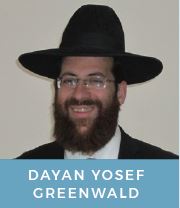Q&A From the Bais HaVaad Halacha Hotline
Pushing On
Dayan Yosef Greenwald
July 15, 2021
Q In most years when Tisha B’Av is on Sunday, 9 Av is actually Shabbos, and the fast is nidcheh (pushed off) to Sunday and therefore more lenient. But this year 9 Av actually falls on Sunday.
When Tisha B’Av is nidcheh, one who is ill and permitted to eat must first recite havdalah. But this year, with 9 Av on Sunday, there is an issur to eat meat and drink wine (Ta’anis 30b). So how does he recite havdalah?
 A Theoretically, one can use chamar medinah (an important drink) for havdalah. But in the United States, it is not clear what drinks qualify. One solution is to give the wine to a child not old enough to be required to refrain. If no such child is available, some poskim rule that one should not say havdalah but wait until after Tisha B’Av and hear it from someone else. This approach is supported by the fact that the Ramban holds there is no Havdalah obligation at all when Tisha B’Av falls on Sunday. In his opinion, unlike other cases of oness (extenuating circumstances) on motza’ei Shabbos, where one delays havdalah until Sunday or Monday when he is able to recite it, in this case he is fundamentally exempt. The Shulchan Aruch rules that havdalah is said, against the Ramban. Nevertheless, this year, when Tisha B’Av is actually Sunday, one might support the above poskim by arguing that perhaps we should combine the opinion of the Ramban with the factor that wine is forbidden and rule that havdalah in principle should never be recited until Sunday night.
A Theoretically, one can use chamar medinah (an important drink) for havdalah. But in the United States, it is not clear what drinks qualify. One solution is to give the wine to a child not old enough to be required to refrain. If no such child is available, some poskim rule that one should not say havdalah but wait until after Tisha B’Av and hear it from someone else. This approach is supported by the fact that the Ramban holds there is no Havdalah obligation at all when Tisha B’Av falls on Sunday. In his opinion, unlike other cases of oness (extenuating circumstances) on motza’ei Shabbos, where one delays havdalah until Sunday or Monday when he is able to recite it, in this case he is fundamentally exempt. The Shulchan Aruch rules that havdalah is said, against the Ramban. Nevertheless, this year, when Tisha B’Av is actually Sunday, one might support the above poskim by arguing that perhaps we should combine the opinion of the Ramban with the factor that wine is forbidden and rule that havdalah in principle should never be recited until Sunday night.
In practice, though, the Sheivet HaLevi (7:77) writes that the common custom is to recite havdalah in all cases even this year, including a choleh, who should make havdalah before eating on Tisha B’Av. But R’ Moshe Sternbuch (Mo’adim Uzmanim 7:255) suggests that perhaps this rule should be limited to men. For women the matter may be different, because they generally avoid reciting Havdalah themselves lechatchilah due to one opinion of the Rishonim that they are exempt. If so, perhaps one should combine this factor with the other considerations mentioned and rule that women should not recite havdalah at all on Tisha B’Av. But practically, even Rav Sternbuch rules that women, too, should recite havdalah in cases where they must eat on Tisha B’Av.